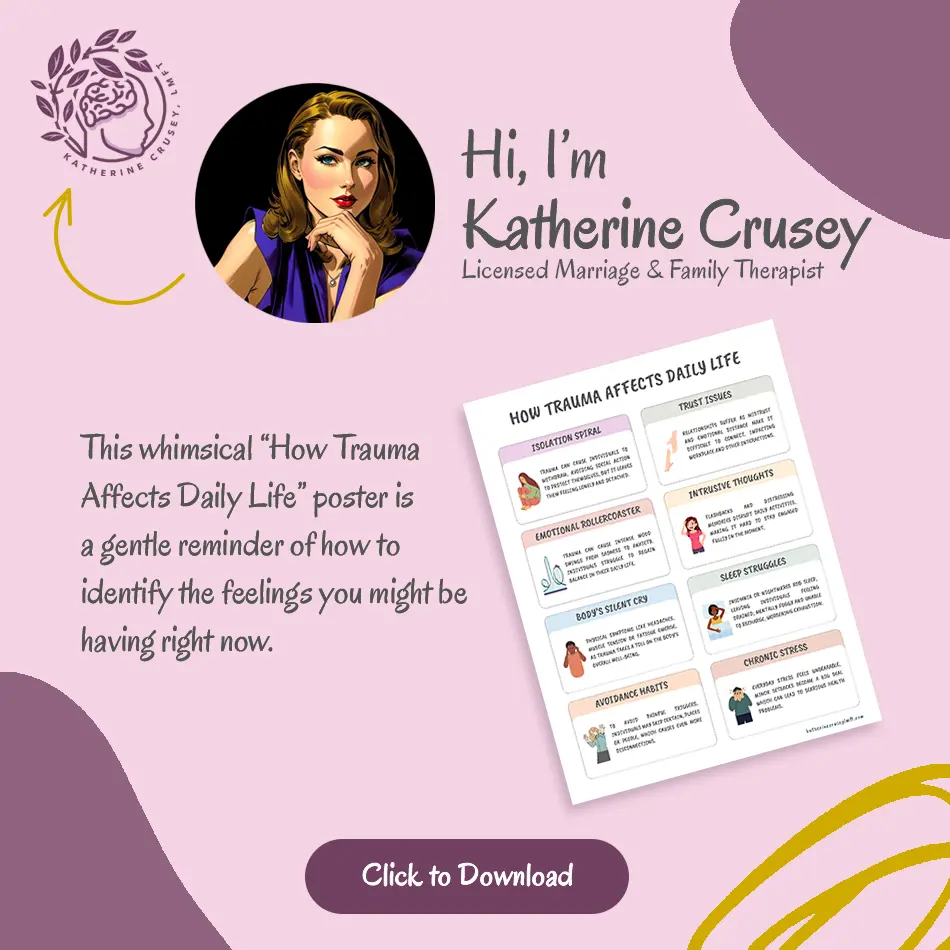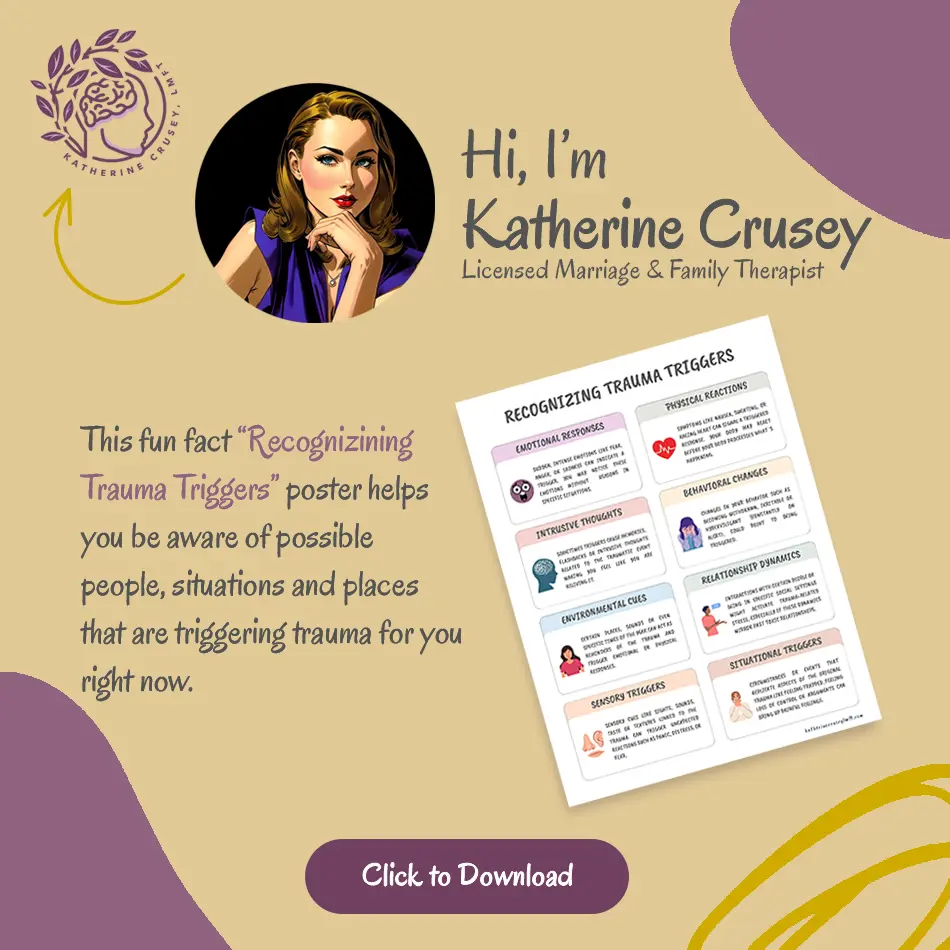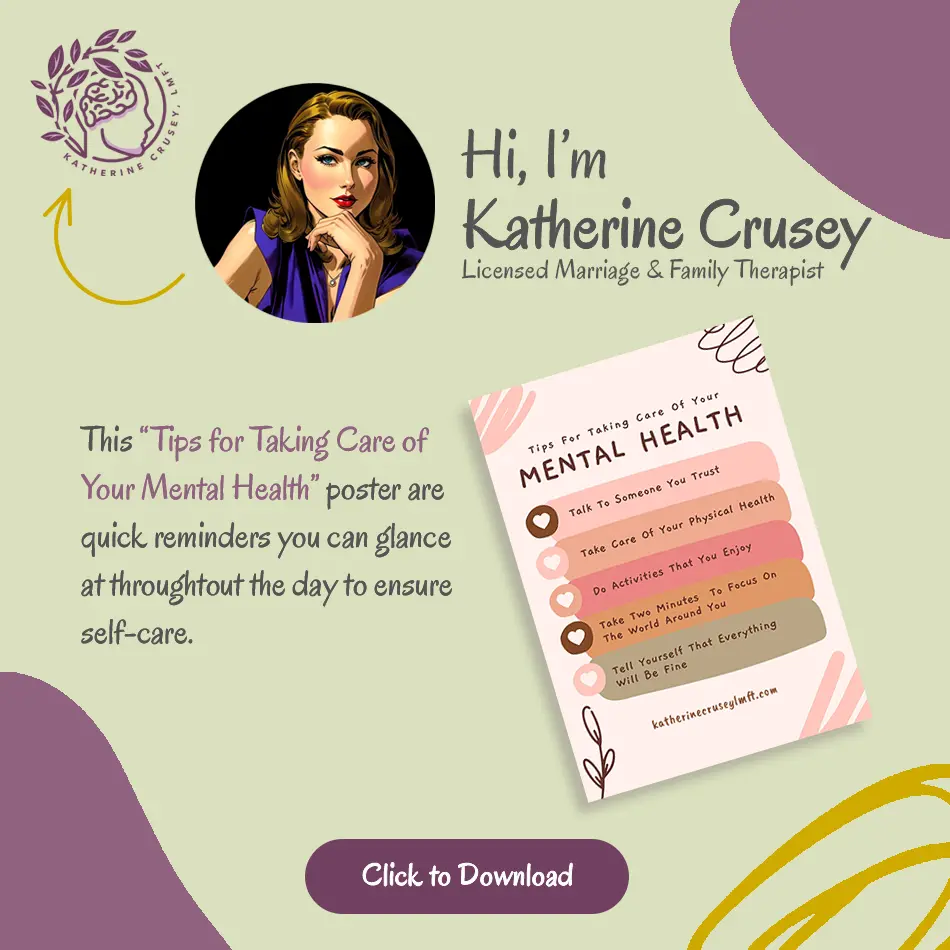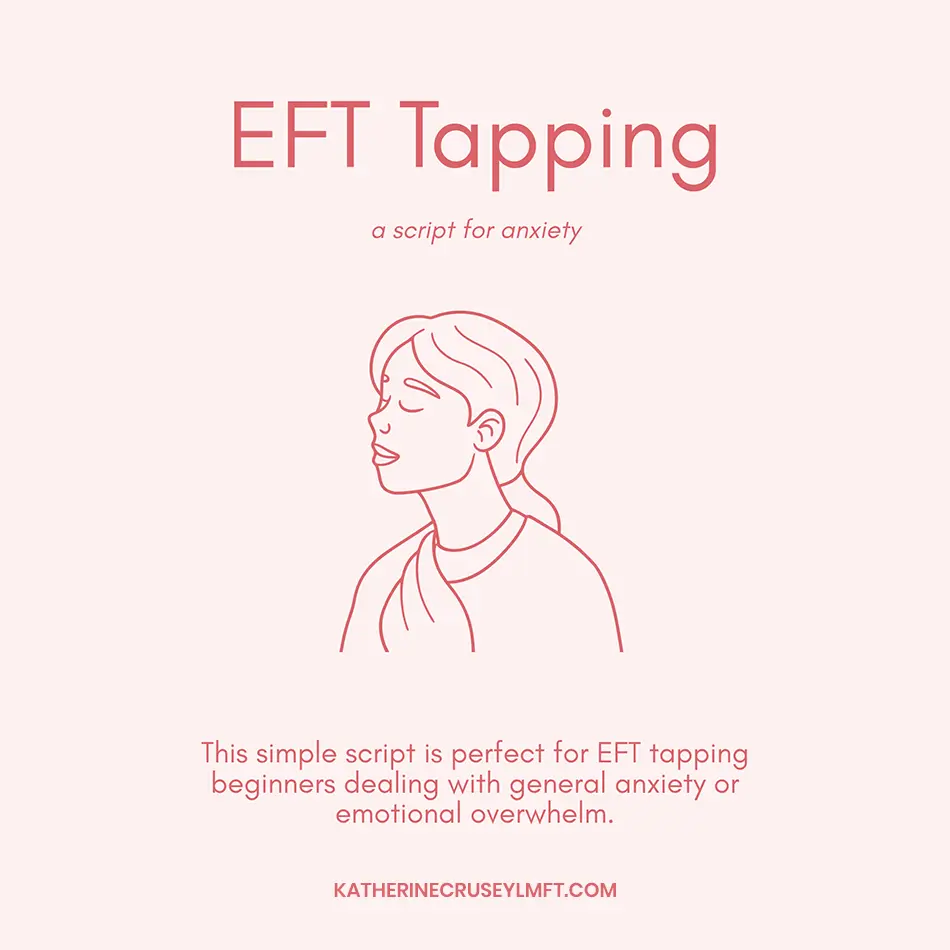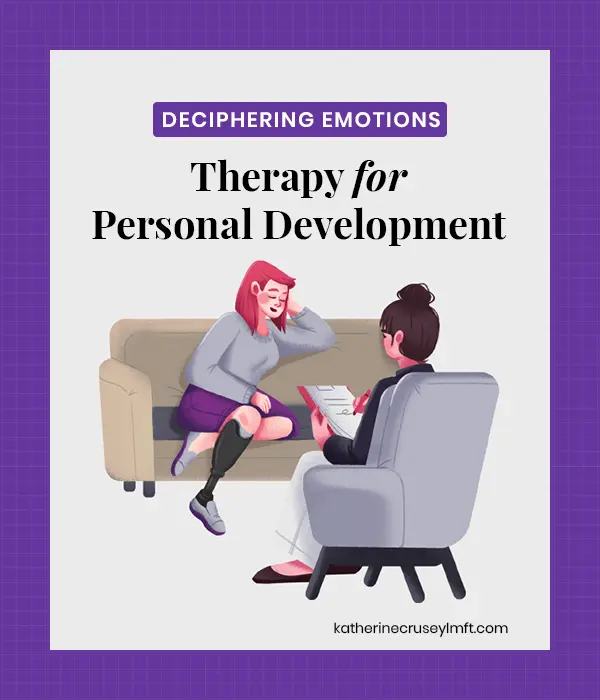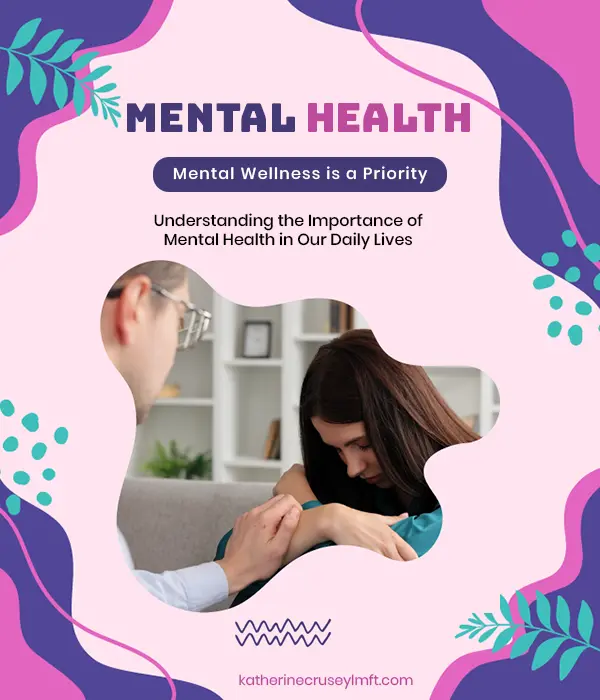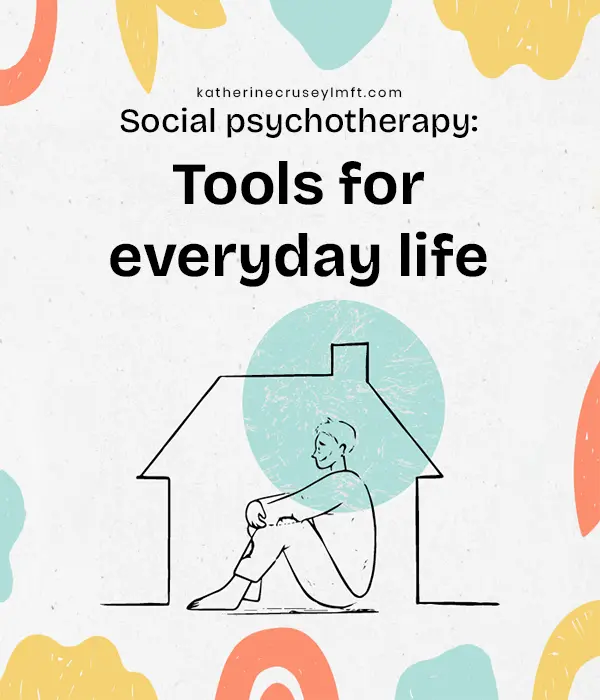EMPOWER YOURSELF
Online Psychotherapy Resources
Free ebooks, worksheets, guides, videos and more for therapy clients provided by Katherine Crusey, LMFT in San Diego, California. These online psychotherapy resources are available as free downloads or you can view them online. Topics include, depression, anxiety, trauma, anger management, and more.
Frequently asked questions
What is EMDR therapy?
EMDR is a psychotherapy approach designed to help people process distressing memories and trauma. It involves guided eye movements or other bilateral stimulation to help the brain reprocess traumatic experiences.
How does EMDR therapy work online?
In online sessions, Katherine Crusey, LMFT uses psychotherapy resources like video calls and tools like finger tracking on the screen, audio tones, or tapping techniques to replicate the traditional in-person EMDR process.
Is EMDR therapy effective when done online?
Yes, research and clinical experiences suggest that online EMDR can be just as effective as in-person therapy for many people. As long as the client has a stable internet connection, a private space, and a skilled EMDR-trained therapist, the benefits remain similar.
Who can benefit from online EMDR therapy?
EMDR is particularly effective for individuals dealing with depression, PTSD, anxiety, phobias, and past trauma. Online EMDR therapy can be a good option for those who have difficulty accessing in-person therapy, such as people in remote areas, those with mobility issues, or those who prefer the comfort of their own home.
What is life transitions therapy?
Life Transitions Therapy focuses on helping individuals cope with significant changes in their lives, such as starting a new job, moving to a new city, or facing the end of a relationship. These transitions can often provoke a depressed or anxious mood, challenging one’s ability to adjust smoothly. Our therapy provides strategies and support to manage these emotions effectively.
Can life transitions lead to reckless behavior?
Yes, significant life changes can sometimes lead to reckless or dangerous behavior, especially if the individual feels overwhelmed, stressed, or unable to cope. This may manifest as substance abuse, engaging in risky activities, or neglecting responsibilities. Recognizing these behaviors as potential symptoms of struggling with a transition is crucial for seeking appropriate help.
How can you support me through life changes?
Katherine Crusey, LMFT offers specialized life transitions therapy tailored to your unique situation. She provides empathetic, personalized support to help you navigate your emotions and challenges during this time. Whether you’re dealing with grief and loss, just got married, or any other major change, she is here to support your journey towards a new life chapter with confidence and resilience.
When do symptoms of ADHD begin?
Symptoms of ADHD most likely begin in childhood. 13% of men and just 5% of women will be diagnosed with ADHD in their lifetime. ADHD can be difficult to diagnose and isn’t recognized to be able to be diagnosed until adulthood clinically. Symptoms may decrease over time but can still remain throughout their life. Hyperactivity may decrease but other symptoms like impulsiveness, difficulty paying attention, and restlessness may continue.
How do I know if I need grief counseling?
If you’re finding it difficult to move forward, or your grief is overwhelming and affects your daily life, seeking grief counseling can be a helpful step. Signs include difficulty coping with daily routines, deep sadness, and inability to enjoy life.
Can grief counseling help with old, unresolved grief?
Yes. In fact, it’s not uncommon for individuals to seek help for grief that’s been carried for years. Katherine Crusey, LMFT can help you process these long-standing feelings of loss, offering new pathways to healing.
How long does grief counseling take?
The duration of grief counseling varies widely among individuals. It depends on the nature of the loss, the complexity of the grief, and the person’s unique needs. Katherine Crusey, LMFT will provide you with the support you need for as long as you need it.
What insurance do you accept?
Among therapy FAQs, this is one of the most common. I work with most major insurance providers, including but not limited to Aetna Health, to streamline the admissions process and get clients the help they need. Click here to view my accepted insurances?
How long will therapy take?
Therapy does not have a specific timeframe, particularly when working on growth and personal development. Depending on the variety of issues that you are desiring to work on and the type of changes you’re looking to make, therapy can last from a few sessions to much longer. In fact, some individuals find therapy to be extremely beneficial and choose to make it a long-term process.
What can I expect to achieve from therapy?
When should I see a therapist?
You are ready to seek therapy if you are committed to making personal changes for greater life satisfaction. Unfortunately, many people believe in order for therapy to be appropriate, they need to be suffering from serious psychological problems or from mental illness. The good news is this is not the case as anyone can benefit from therapy. In truth, some individuals even choose therapy just for insight.
What are your fees?
My fee range varies by service provided, but in general, it’s $250/hour. However, I will be happy to discuss rates with your during our initial contact.
How often do I come in?
In general, once a week sessions are the standard for individual therapy. Although, clients are welcome to seek more frequent sessions if they want greater insight or are in crisis.
What is your cancellation policy?
My cancellation policy requires 48 hour notice of cancellation. Cancellation with less than 48 hours notice requires payment in full. If you are unable to attend your session online, you may be able to do it via phone.
Does what we talk about in therapy remain confidential?
Confidentiality is one of the most important components in therapy, as successful therapy requires a high degree of trust. With few exceptions, the highly sensitive material that is discussed between you and your therapist will not be shared with anyone else without your permission. For example, therapists are legally mandated to make certain disclosures in cases where there is suspicion of harm to oneself, harm to others, or child abuse. Additionally, your therapist may share information with someone on your healthcare team (your physician, attorney), but by law will only be allowed to release this information after obtaining your written consent. All such disclosures will be discussed with you in advance.
Do you prescribe medication?
Because I am not a psychiatrist, I do not prescribe medication. However, in some cases medication can be valuable in combination with psychotherapy. If I determines that you could benefit from meeting with a psychiatrist, I can assist with referring you to someone in my trusted network of referrals.




